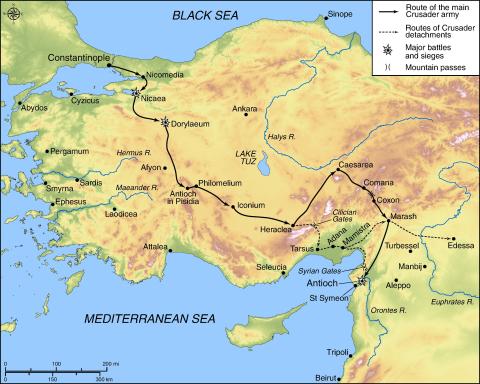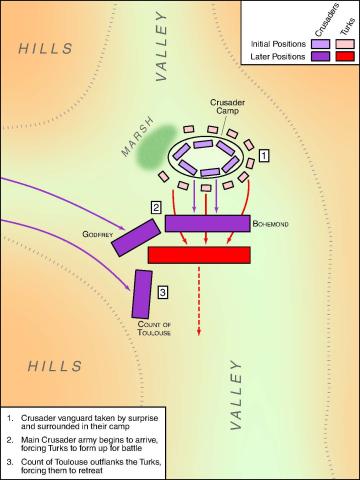The Battle of Dorylaeum
[3.9.1] Intereā, redditā cīvitāte et Turcīs dēductīs Cōnstantīnopolim, unde imperātor magis magisque gāvīsus quod cīvitās reddita sit ēius potestātī, iussit maximās eleemosynās ērogārī nostrīs pauperibus. Dēnique prīmā diē quā recessimus ā cīvitāte, vēnimus ad quemdam pontem, ibique mānsimus per duōs diēs. Tertiā autem diē, priusquam lūx coepisset orīrī, surrēxērunt nostrī; et, quia nox erat, nōn vīdērunt tenēre ūnam viam, sed sunt dīvīsī per duo agmina, et vēnērunt dīvīsī per duōs diēs. In ūnō agmine fuit vir Boamundus, et Rotbertus Nortmannus, et prūdēns Tancredus, et aliī plūrēs. In aliō fuit comes Sānctī Egidīī, et dux Godefridus, et Podiēnsis epīscopus, et Hugō Magnus, comesque Flandrēnsis, et aliī plūrēs.
[3.9.2] Tertiā vērō diē irruērunt Turcī vehementer super Boamundum et eōs quī cum ipsō erant. Continuō Turcī coepērunt strīdere et garrīre ac clāmāre, excelsā vōce dīcentēs diabolicum sonum nesciō quōmodo in suā linguā. Sapiēns vir Boamundus vidēns innumerābilēs Turcōs procul, strīdentēs et clāmantēs demoniacā vōce, prōtinus iussit omnēs mīlitēs dēscendere, et tentōria celeriter extendere. Priusquam tentōria fuissent extēnsa, rūrsus dīxit omnibus mīlitibus: “Seniōrēs et fortissimī mīlitēs Chrīstī, ecce modō bellum angustum est undique circā nōs. Igitur omnēs mīlitēs eant virīliter obviam illīs, et peditēs prūdenter et citius extendant tentōria.”
notes
vocabulary
3.9.1
unde: from which (cause, origin, etc.) (OLD 11)
eleemosyna –ae, f.: charity, alms (LL)
ērogō (1): to pay out, disburse
pons pontis, m.: bridge
3.9.2
continuō: forthwith, immediately
strīdō strīdere strīdī: to shriek
garriō garrīre garīvī: to chatter
tentōrium –iī, n.: tent
modo: now
prūdenter: carefully


